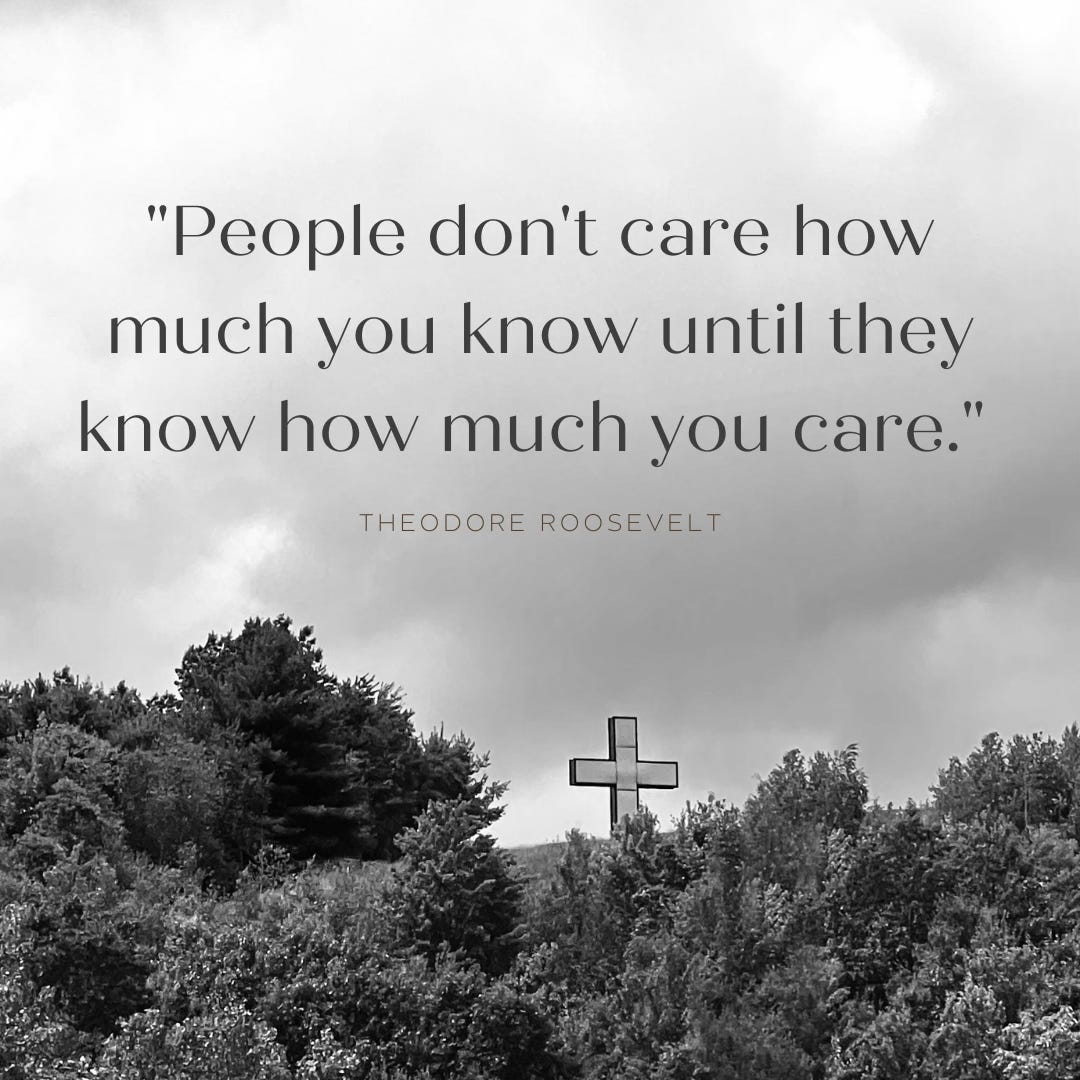A recent video I watched showed a pastor sharing a story about a family visit to another state. One day, he headed to a local coffee shop, where he noticed the owner had published a book. As the pastor paged through the book, he learned the author was a Christian. A few moments later, that same man walked through the store. The two struck up a conversation when the pastor asked where to attend church that Sunday. The owner replied that he didn't attend church.
The pastor exclaimed surprise at this; after all, the man said he was a Christian. He continued to share that they spent the next 15 minutes debating the value of the local church. Much to the pastor's dismay, he didn't convince the man to change his mind about church. On his way out the door, the man called out to the pastor, "Love ya, man." The pastor shared that while he didn't say anything in response, he wished he had said, "You love me? You don't even know me, man."
On the surface, this interaction wasn't much. After all, many profess love for Jesus but struggle with His Church. And in many cases, I see why. But something felt off; I felt surprised and saddened by this pastor's tone and perspective. The example he tried to make didn't work with this illustration. But then, the more I thought about the interaction, the more frustrated and disappointed I felt.
I started to wonder:
What happened to the coffee shop owner that he distrusted the church?
What wounds did he carry that Jesus could heal?
Why was the pastor more set on being right and winning a debate than extending compassion and love?
It'd be easy to chalk this story up as a one-off. Maybe the pastor himself was having a bad day, but scroll through social media, and you'll see how professed Christians respond. From pro-life debates to declarations of how to live to political stances, it's become clear that many Christians live more by pursuing being right than the compassionate life Jesus modeled.
Where did our compassion go?
On the one hand, with leaders straying so far from the compassion that Jesus Himself breathed out on those around him (Matthew 9:36), it makes sense why those following might lose their way. Followers emulate their leaders. Or, as a previous leader of mine used to say, the fish stinks from the head down. But, in case we forget, pastors and church leaders are human with the same struggles, temptations, and hurts we experience. No one is exempt (John 16:33). So there's grace.
Even as I write these words, I wonder what happened to this pastor and others like him, that their response to the people they're entrusted to lead lacks compassion. What wounds do they carry that Jesus could heal?
Compassion or being right?
But compassion and mercy aren't always lived out front and center, are they? Jesus highlighted this as he told the parable of the good Samaritan (Luke 10:30-37). A man going from Jerusalem to Jericho was beaten by robbers and left to die. Two men, whom you'd expect would be the ones to help —a priest and a Levite, moved to the other side of the road and passed him by instead of reaching out. Along came a Samaritan, a Jewish enemy who may have had every reason to pass by; instead, he stopped and cared for the wounded man. This man extended compassion.
How often do we claim to be good like the Samaritan (or want to) until someone butts up against our opinions or ideas? Then, much like the pastor I shared, the pursuit becomes more about being right, about convincing the "other side" why they're wrong, and making it seem they're living in grievous sin because of their point of view.
How did we get so far from Christ's heart for people?
"When he saw the crowds, he had compassion on them because they were confused and helpless, like sheep without a shepherd." Matthew 9:36
"Jesus saw the huge crowd as he stepped from the boat, and he had compassion on them and healed their sick." Matthew 14:14
"When the Lord saw her, his heart overflowed with compassion. "Don't cry!" he said." Luke 7:13
"Then Jesus said, "Come to me, all of you who are weary and carry heavy burdens, and I will give you rest. Take my yoke upon you. Let me teach you, because I am humble and gentle at heart, and you will find rest for your souls. For my yoke is easy to bear, and the burden I give you is light." Matthew 11:28-30
How, then, do we respond?
First, regardless of which side of the situation we stand on, as followers of Jesus, let's remember that He made it clear the world will know we are His by how we love one another (John 13:34-35). Love is compassionate and kind (1 Corinthians 13:4-7). Life isn't about one long debate but a calling to make disciples of all nations (Matthew 28:19-20), not only for fellow believers but for the very people He came to save (Romans 5:8).
Who?
Your neighbor, even those who disagree with you politically.
The person who holds a different view from yours on family, theology, or anything else.
But especially those who don't know Jesus.
This isn't to say there's never a time for theological debates or discussions, but if you struggle to extend compassion and love to someone, perhaps it's time to reconnect with Christ's love and compassion first. Read stories about Jesus' interaction with those He met. Remember who God is and what He did for you through Jesus, just as He did for others.
"If I could speak all the languages of earth and of angels, but didn't love others, I would only be a noisy gong or a clanging cymbal." 1 Corinthians 13:1
Everyone has one
Years ago, my mom told me everyone has a story. At the time, she was trying to help me see that someone else's hurtful words were rooted in just that —hurt. As followers of Jesus, we have an opportunity to bring healing —sometimes it may be physical healing, but I think, more often than not, it's emotional healing, even spiritual healing (Proverbs 12:18; 1 Thessalonians 5:11). We have a chance to offer a healing balm for wounds that keep people from seeing Jesus's love and compassion (Proverbs 16:24).
When we remember everyone has struggles and triumphs, we realize that what we see is a mere fraction of their lives. And if someone shares that they're not attending church, even as a believer, maybe instead of debating what is "right," we ask questions to learn.
After all, isn't that how Jesus responded to people around him?
The two blind men —what do you want? (Matthew 20:29-34)
During a conversation with his disciples after people were speculating who Jesus was —who do you say I am? (Luke 9:18-20)
When a woman reached out to touch His hem —who touched me? (Mark 5:25-34)
In each instance, Jesus could've answered and discussed the "right" way to live. After all, He knew everything. Instead, He offered compassion, invited them closer, and He healed.
"When Jesus heard this, he told them, "Healthy people don't need a doctor—sick people do. I have come to call not those who think they are righteous, but those who know they are sinners." Mark 2:17, NLT
And, in case we forget, "for all have sinned and fall short of the glory of God." (Romans 3:23)
A Warning
Jesus also warned people, especially those who thought they were righteous. In Matthew 23:13-35, Jesus spoke to the Pharisees and Sadducees who were so bent on following the law that they missed God's heart and failed to confess their own.
"What sorrow awaits you teachers of religious law and you Pharisees. Hypocrites! For you are so careful to clean the outside of the cup and the dish, but inside you are filthy—full of greed and self-indulgence!" Matthew 23:25
How's the inside of your cup?
However, if you find yourself on the receiving end of someone's ire, here's a story I hope encourages you.
In 2005, my youngest daughter died from injuries she sustained in a fire that also destroyed our home. I met with our funeral director before her celebration of life services began. He instructed me on what to expect, from service details to interactions with those who attended.
While I don't recall everything, I remember him saying this: People say stupid things. People want to offer comfort and connection. Some might hug, while others offer words. He warned me that some of those words might sting, but to offer grace if I could. I was experiencing something most only feared, and they didn't know how to relate.
I'm grateful for this man's wisdom because people said things that, had they put themselves in someone else's shoes, they might not have said.
People merely try to connect … extend grace when they stumble. We all need that, don’t we? [Sidebar: If someone's words or actions are abusive or controlling, that's another story that requires a different response. If possible, the best thing you can do is end the conversation and walk away.]
I hope the pastor I mentioned earlier was just trying to connect and flubbed. But I wish he had chosen to listen instead of debate. I wish he had heard the Holy Spirit whisper, "This man needs hope and healing," and provided a place to share instead of being incensed that he couldn't prove he was right. I wish this pastor realized that as a follower of Jesus, he carries hope and can point others to Jesus with each interaction.
Relationships and interpersonal connections can be complex; there's no doubt about that. In today's climate, tensions run high, and the world feels like a tightly wound rubber band. Even so, maybe we're being called to greater compassion. Perhaps it's time to release the pursuit of being right for the gift of grace. And maybe we Christians will become more known for our love than for winning an argument. Who knows, once you offer compassion, maybe they'll listen to what you have to say.
I’m curious, how do you respond when someone holds a different perspective or viewpoint than you? Do you listen, or are you quick to defend your position?
Women’s Devotional Bible: The Message
We’re getting closer to the official release of NavPress’s The Women’s Devotional Bible: The Message* on August 5! Don’t forget you can preorder a copy, or order The Gospels and their accompanying devotions* now.
*These are affiliate links. If you purchase books through these links, I receive a small commission from Bookshop.org, a platform supporting independent bookstores by helping them maintain their presence in local communities.







